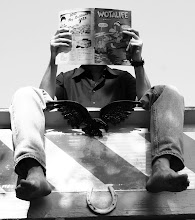
It was a silver-plated mint spoon, perhaps the most-beautifully crafted spoon I have ever seen, one so small as to line up against a man's forefinger with length to spare. It was early Winter, 1963, father was on route to Stuttgart, heading through the Black Forest in his Heinkel Kabine, a teardrop-shaped, three-wheeled vehicle. Hitting black ice at a high rate of speed, the absurdly-designed car careened across the roadway, like a pip jettisoned from the mouth of an unmannerly giant, its body-length door springing open to let loose its only occupant. Father never knew just how long he lay unconscious on that frozen road, but when he finally opened his eyes there was the tiny, delicate spoon, sitting on the black tarmac, only inches from his bleeding forehead. He often claimed it was a sign from above, an assurance that he had been saved by design, but any God inclined to choose surely could have found a man more deserving of continued life than father. Nevertheless, the spoon was unfurled with grave reverence upon his return home, mother having to polish it a dozen times to satisfy him. It then took a special place in the cutlery drawer, seated like a flute upon a soft section of plush red velvet. But it was no mere trophy to only be looked upon. Father insisted on its use at special meals, those Sundays when he had the clarity of mind to present himself at the back door for supper, a leg of lamb or veal sitting on the table, a jar of vinegar mint beside it, the treasured utensil dipped into the green-specked pool.
It must have been 1970, perhaps 1971, when that special spoon suddenly disappeared.
It was the morning following a Sunday meal. The family was living in America by this time, of course, and father was experiencing one of his dry spells, but his anger was still a thing to be reckoned with. I can still see mother standing at his side, as he pointedly ignored her, his red face hidden behind the morning paper. “Georg,” she whispered, squeezing her hands together against her apron, her head bowed. “I have something to tell you – something rather awful, I'm afraid.” He rustled the paper, still ignoring her. “Georg,” she continued, in the tone of one who'd suffered more than her share, the voice of her side of the family, the Jewish side, the people who bore despair better than any other, as she so often reminded us. “It's the mint spoon – it's, I – it's gone, Georg – I think it accidentally got put out with the trash.”
I had certainly seen my father hit my mother before then, but never so viciously, never with such an overwhelmingly desirous look on his face for the very violence of the act. He struck out so quickly that the paper caught in his ring finger, tearing the front page, which folded about his open hand like a glove, a newsprint mitten that connected with mother's brow, sending her backwards, staggering against the sink. Even though I was tall for my age, I was only eleven, all I could do was watch, watch as he forced her to search the kitchen for that spoon, search every last place it might possibly be. I sat there, glued with terror to my chair, catching the desperate rage burning in his eyes, seeing how he drove her into another flood of tears every time she begged him to understand it was truly gone, only to have him swell up like a sail to the wind, bellowing through spittle, demanding she think of another place to search. When it was apparent to even his addled mind that she wasn't lying I saw a change in his face that I will never forget. He almost grinned, that jackal of a man, wiping his moist lips with his hand, the hand he'd hit her with. He then waved a finger in the air before her face and coldly stated: “But you'll keep looking for it, Mrs. Vogel, you'll keep looking for it.” And she did, for how long I don't care to recall, him standing there, his belly working its way from under his T-shirt, his greasy forehead etched with the contempt of a man who measured his failure by the days he felt he had to endure his own family.
I suppose it's a wonder I can still find such beauty in a spoon. I might want to justify that by claiming it a little victory over the memory of father, but I'm not sure it has anything to do with him. I believe it has more to do with mother, bless her, for somewhere in heaven I know she is still looking for that fragile, beautifully insignificant little implement.
©2008 Jeremy W. Eaton

No comments:
Post a Comment